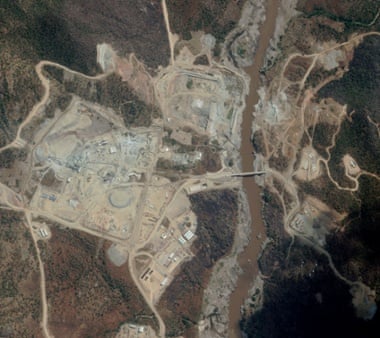논란의 '나일강 상류 댐' 건설 합의 Egypt sets concerns aside to sign Nile dam deal with Ethiopia and Sudan Despite fears of,..
Ethiopia’s Grand Renaissance dam, here seen under construction
from a satellite, will be the largest in Africa when it is completed in 2017.
Photograph: DigitalGlobe/Getty Images
에티오피아의 건설 중인 그랜드르네상스댐 위성 사진
2017년 완공되면 아프리카 최대의 댐이 된다. kcontents

edited by kcontents
케이콘텐츠

AFP in Khartoum Egypt has agreed to a preliminary deal with Ethiopia on a dam project that Cairo had feared would hamper the flow of the Nile, paving the way for a binding regional agreement that has been years in the making. The leaders of Egypt, Ethiopia and Sudan gathered in Khartoum on 23 March to sign the agreement of principles on Ethiopia’s Grand Renaissance dam project. “I confirm the construction of the Renaissance dam will not cause any damage to our three states and especially to the Egyptian people,” Ethiopian prime minister Hailemariam Desalegn said at the signing ceremony. Egypt, heavily reliant for millennia on the Nile for agriculture and drinking water, feared that the Grand Renaissance dam would decrease its water supply. However, Egyptian President Abdel Fattah al-Sisi said on Monday that “this is a framework agreement and it will be completed. We have chosen cooperation, and to trust one another for the sake of development.” He said the final accord will “achieve benefits and development for Ethiopia without harming Egypt and Sudan’s interests”. Sudan’s president, Omar al-Bashir, hailed the deal as “historic”. Ethiopia began diverting the Blue Nile in May 2013 to build the dam, which will be Africa’s largest when completed in 2017 and will generate 6,000 megawatts of electricity. Egypt believes its “historic rights” to the Nile are guaranteed by treaties from 1929 and 1959 which grant it 87% of the river’s flow and the power to veto upstream projects. But Nile Basin countries, including Ethiopia, signed another deal in 2010 allowing them to work on river projects without Cairo’s agreement. In protest, Egypt withdrew from the Nile Basin Initiative, a forum to discuss management and development of the region’s resources, but later resumed participation. Neither Sudan nor Egypt has signed the 2010 Nile Basin deal. Sudan, like Egypt, relies on Nile resources but has said it does not expect to be affected by Ethiopia’s Grand Renaissance project. |
edited by kcontents
"from past to future"
데일리건설뉴스 construction news
콘페이퍼 conpaper









